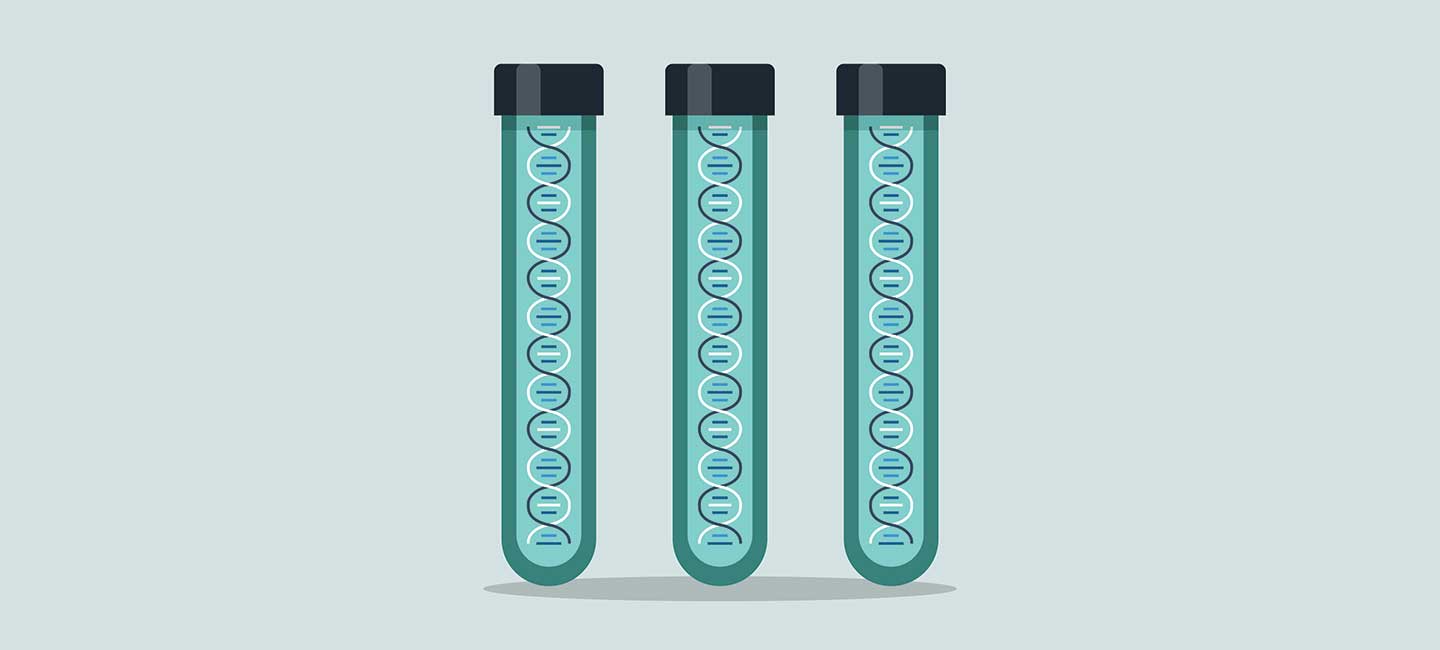5 Myths About Genetic Testing
Genetics play an important role in cancer, from dictating treatment to identifying other family members who may be at risk. At Moffitt Cancer Center, there are eight certified genetic counselors that help guide patients through the testing process, interpret results and recommend screening and prevention strategies.
Genetic testing has changed over the years, so it’s important to make sure you have all the right information before deciding if genetic testing is right for you.
Here are the most common genetic testing myths:
Most cancer is due to an inherited risk.
“Many people assume that most cancer is due to a genetic factor within their family. In fact, most of the time cancer is sporadic or happens completely by chance. Only about 5% to 10% of all cancers are due to a single inherited genetic factor,” said Kathleen Gewandter, a certified genetic counselor. “In most of these families with an inherited cancer syndrome, we see a pattern of the same cancer or cancers that we know are related, like breast and ovarian cancers or colon and uterine cancers. These cancers can be seen at much younger ages than sporadic cancers and we may see an individual develop multiple cancers. Other factors can also suggest an increased risk, such as a rare cancer that we know has a higher portion that are due to an inherited cause, like medullary thyroid cancer or pheochromocytomas. In families where we find an inherited cancer syndrome, we can make recommendations for screening or prevention strategies to minimize the chance of developing cancer or catching it as early as possible. Knowing your family history of cancer is an important tool in being proactive about your cancer risk.”
If you have an inherited cancer risk, you’re guaranteed to get cancer.
“Some individuals think that if you're born with a hereditary cancer syndrome, that means you're guaranteed to get cancer. But, that's a myth,” said Caroline Bertsch, a certified genetic counselor. “What actually happens is that when you're born with a hereditary cancer syndrome, that means that one of your genes that usually works to protect you from developing cancer isn't working like it should. And so, you're actually born with a higher chance to develop cancer. But that doesn't mean you're definitely going to get cancer. It just means that we need to be more careful with your cancer screenings.”
Genetic testing for cancer risk is only for women.
“It is equally as important for men as it is for women with strong family histories of cancer to be evaluated by a genetics professional. There are many genes that we all have that are supposed to protect our bodies against developing cancer, and both men and women can be born with mutations in these genes that increase their chance to develop cancer,” said Sarah Burke, a certified genetic counselor. “For example, having a mutation in the BRCA gene running in someone's family can cause women in the family to develop breast or ovarian cancer, but it can also put men in the family at increased risk to develop their own cancers, primarily male breast cancer, prostate cancer or pancreatic cancer. And for that reason, it’s recommended for all men who have a strong family history of women in their family with breast cancer to be evaluated themselves.”
BRCA1 and BRCA2 are the only genes related to breast cancer.
“When talking about inherited breast cancer risk, the only genes you typically hear about are the BRCA1 and BRCA2 genes. While the BRCA1 and BRCA2 genes are well known, few people know that there are many other genes related to breast cancer risk that can run in the family,” said Christine Steele, a certified genetic counselor. “While you may not have heard of these other breast cancer genes, they're equally as important to be tested for. For instance, did you know there's a gene called PALB2 that can cause up to 60% lifetime risk for breast cancer as well as an increased risk for pancreatic cancer? When meeting with a genetic counselor who has special training in medical genetics, they will talk to you about different options for genetic testing. The type of testing that we typically perform now is called multi-gene panel testing, which is where many genes are analyzed at once to help determine whether someone has an inherited risk for cancer. This testing includes all the genes related to breast cancer, not just BRCA1 and BRCA2, to ensure that you and your family get the most comprehensive information possible to be proactive in your health.”
Genetic testing costs thousands of dollars.
“A lot of patients think that genetic testing is going to cost thousands of dollars, and until about 2015, testing could cost between $4,000 and $6,000. Since then, with competition and increasing insurance coverage, most patients pay between $0 and $100, and some patients have the option to self-pay for $250,” said Laura Barton, a certified genetic counselor. “You can speak with a genetic counselor or your insurance company about coverage for testing.”



